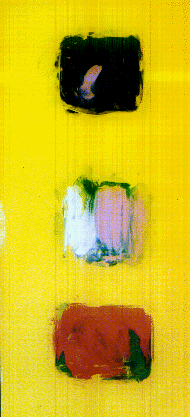
Writings (with Excerpts) Distempered Lyrics 1980. (Poetry) The day rolls over uneasily beneath the brittle covers. Jagged edge on ragged edges catch some recent indiscretion, unraveling a scar. The center holds in a way-- give or take some integrity (skeins of nerve intwined in clay). Just the periphery's sliced away in the wiry glare.
A Passion of the Mind 1980. (Play) Caroline: You play prophet? I'm sorry, but I can't imagine your life taking any different form, under any other sun. The point is, your thinking has so little upshot. You never do anything. Maybe you're afraid that if you try, you'll fall flat on your--brain. John: I don't think you understand. Caroline: That "understanding" has its limitations? John: That meaningful action is more difficult now. It's hard to travel where the paths haven't been cleared. Caroline: But you hack aimlessly in all directions. John: It's difficult, more than you imagine. Caroline: You can't even seem to arrange a room, let alone a life. If that isn't paralysis . . . John: The ideal is purity and Caroline: The reality is poverty. John: No, parsimony--a cleansing . . . Caroline: A barrenness. You have no heart.
Considerations On the Nature of Things 1986. (Philosophy) Mark Fidrych, the pitcher, with bases loaded and the game in the balance, calmed his nerves with thoughts of universal death, in 10 or 20 billion years. Shakespeare, and more clearly still Sakyamuni, discerned that, if all is time, and time is change, neither time nor change could be what they appear, could be anything at all. The world of the Western God, seen from on high, as of the Buddha, seen from anywhere, is a world without concepts. In such a world, from such a perspective, disease, old age, and death find resolution. But this surely is our world too. And so the question returns: What is time?
Philosophical Aphorisms 1987. (Philosophy) 782. That no interest is without presumption, act without interest. 783. Between ourselves and salvation stand the presumptions of knowledge. 784. Hope, as theological virtue, counters presumption. 785. We show the temporal dimension to logic. 786. We struggle to disentangle past from future. 787. The discipline we seek strives to break presumption. 788. The future is our paradigm of freedom. 790. We breathe future time. 791. Our experience of life decides how we use freedom past presumption. 793. That humility implies benevolence: Do not presume to deny the pain of others. 794. Life's meaning: That we are one way, against possibilities to come. 795. And if nothing unusual should arise? Our death is unusual. 796. The stars, in metaphor or science, are possibilities of other worlds. 797. God: Presume nothing, not even ourselves. 798. Humility embraces all forms of life, and what comes.
Meaning and Time 1988. (Philosophy) 289. The future is a metaphor of grace. 290. What have we overcome? The incontestable reality. 291. Our tears evaporate in an azure dew. 292. Time, within the limits of certainty, is eternity.
A Manifesto: Meaning and Time 1988. (Philosophy) See Art Theory
Disquisitional Simulacra 1990. (Philosophy) 303. As Mary, and Christ: A young girl's face has circumscribed the whole. 304. For confidences, we substitute ecstasies. 305. The wind, breath of gods: We reduce what may be to what is familiar. 306. And so, desire-bound, we trace the face of redemption.
Issues of Objects 1991. (Philosophy) 144. The pain we suffer is of decay. 145. Life is greater than praise. 146. Our concepts are brittle, generality sufficiently applied. 147. Preeminently, philosophy is a weapon. It kills on behalf of the meaning of the world.
Externalities 1994. (Philosophy) 3. Beneath the surface of Rembrandt lay Vermeer.